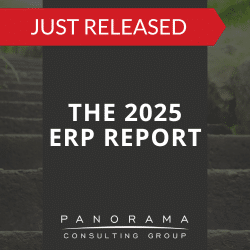As enterprise software continues to evolve, so do the challenges associated with ERP implementations.
Today, we’ll delve into the latest enterprise software trends shaping the future of ERP systems and discuss common challenges organizations face during implementation.
Enterprise Software Trends and Implementation Challenges
1. Rise of Cloud-Based ERP Solutions
Cloud computing has revolutionized the way businesses operate, and ERP systems are no exception.
According to our 2024 ERP Report, there has been a significant year-over-year increase in organizations selecting cloud software, with 65% of organizations opting for cloud solutions last year and 52% the prior year.
Cloud-based ERP systems offer numerous advantages:
- Scalability: These systems can easily scale to meet the fluctuating needs of businesses.
- Cost-Effectiveness: They reduce the need for significant upfront capital expenditure on hardware and maintenance.
- Accessibility: Cloud technology supports remote work by allowing access from anywhere with an internet connection.
For example, a manufacturing company might use cloud-based SCM software to streamline its supply chain management. By analyzing real-time data, the system could find ways to reduce operational costs and improve inventory management.
Implementation Challenges: While cloud ERPs offer many benefits, organizations must also address challenges such as data security and integration with existing systems. We recommend ensuring robust cybersecurity measures and selecting a vendor with strong integration capabilities.
Contemplating litigation?
We have multiple software expert witnesses available for provision of reports, depositions, and testimonies.
2. Integration of Artificial Intelligence (AI)
When our ERP consultants implement ERP solutions for clients, we help them integrate these technologies with modern and emerging technologies that fit their specific business needs.
This includes artificial intelligence. AI in ERP is an integral component of modern enterprise software as it enables predictive analytics and smarter decision-making.
For example, a food and beverage company might use AI-powered ERP to forecast demand and manage inventory levels. By analyzing sales data and seasonal trends, the company could reduce spoilage and ensure optimal stock levels.
Implementation Challenges: Adopting AI requires a robust data infrastructure and skilled personnel to manage the algorithms. Organizations should invest in training and development to build these capabilities internally.
3. Emphasis on User Experience (UX)
As ERP systems become more complex, user experience has become a critical factor in their design and adoption.
Modern ERP software incorporates UX components such as:
- Intuitive Interfaces: Simplified navigation and dashboards make it easier for users to access the information they need.
- Customizable Workflows: Tailoring workflows to match user roles and preferences enhances efficiency.
For example, a financial services company might implement an ERP system with a highly intuitive interface, allowing employees to quickly access financial reports and analytics. By streamlining these processes, the company could improve decision-making and operational efficiency.
Implementation Challenges: Achieving an optimal UX requires extensive user feedback and iterative design processes. Organizations should invest time and resources to understand user needs and continuously improve the system.
4. Increased Focus on Business Intelligence (BI)
Business intelligence is a critical component of ERP systems, enabling organizations to transform data into actionable insights. In fact, our 2024 ERP Report found that 84% of organizations deployed BI initiatives as part of their ERP projects.
BI capabilities can drive strategic decision-making by way of:
- Data-Driven Insights: BI tools analyze data from various sources, providing insights into business performance.
- Real-Time Reporting: Real-time data access allows organizations to respond quickly to market changes.
A healthcare organization, for instance, might use ERP-integrated BI tools to monitor patient care metrics and operational efficiency. By analyzing this data, the organization could identify areas for improvement and enhance patient outcomes.
Implementation Challenges: Integrating BI with existing ERP systems can be complex. Organizations must ensure data quality and consistency across different sources to generate reliable insights.
5. Greater Emphasis on Cybersecurity
As ERP systems become more integrated and data-driven, the need for robust cybersecurity measures has never been greater.
Protecting sensitive business data from cyber threats is a top priority for organizations. They are implementing enhanced cybersecurity measures to protect business operations and data integrity.
Examples include:
- Data Encryption: Encrypting data at rest and in transit ensures that sensitive information remains secure.
- Access Controls: Implementing strict access controls prevents unauthorized access to critical data and systems.
For instance, a professional services firm might use advanced cybersecurity measures in its ERP system to protect customer data and comply with regulatory requirements. By securing their ERP environment, the institution could prevent data breaches and maintain customer trust.
Implementation Challenges: Implementing cybersecurity measures can be costly and complex. Organizations must continuously monitor and update their security protocols to address emerging threats.
6. Increased Focus on Organizational Change Management (OCM)
Successful ERP implementations require more than just technology; they also require end-users that are prepared for and supportive of the new system.
While there are many ways to prepare employees for change, two of the most effective ways of ensuring higher adoption rates include:
- Training and Support: Providing comprehensive training and ongoing support helps employees adapt to the new system.
- Stakeholder Engagement: Involving stakeholders throughout the implementation process ensures that their needs and concerns are addressed.
For example, a field service company might implement an OCM strategy to support its ERP deployment. By conducting regular training sessions and workshops, the company could ensure that technicians are proficient in using new mobile functionalities.
Implementation Challenges: OCM requires significant investment in time and resources. Organizations must be committed to continuous engagement and support to address resistance and ensure a smooth transition.
Navigating ERP Software Trends
While these trends offer significant benefits, they also present implementation challenges that organizations must navigate carefully. By understanding these trends and adopting best practices, your organization can leverage ERP systems to drive growth, innovation, and operational efficiency. (Read more about Business Technology Trends here.)
Our ERP selection consultants provide expert guidance on technology selection, implementation approaches, and change management strategies. Contact us to learn how we can support your ERP project.














